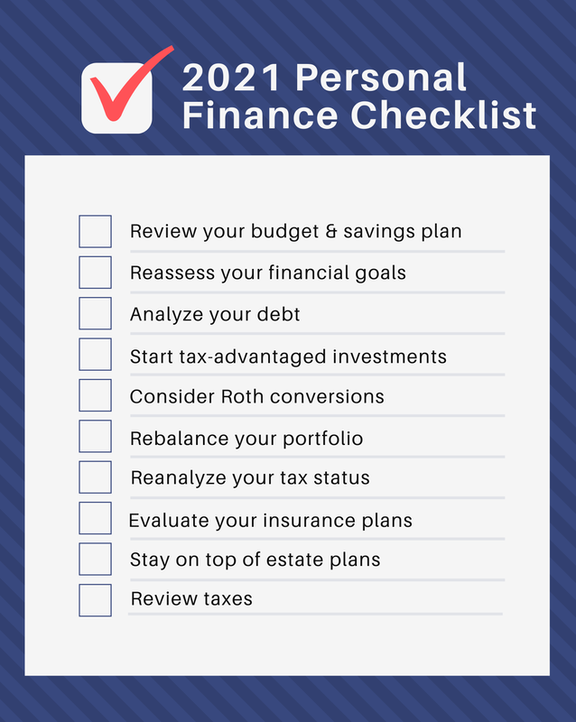|
It is almost time to bid goodbye to 2021. This year there have been some challenges as we continue to recover from the pandemic in 2020. The stock market is regaining its old charm, and we are looking to better days ahead in 2022. Before you plan too many adventures in 2022, it is wise to do an end of year personal finance checkup. Are you sticking to your budget? Are your investments performing well? Are you on top of your estate plan or have there been changes that need to be made? How are your taxes looking for 2021? Here are some tips that can help you in your personal financial management as well as checking with your professional financial advisor if you have questions.
1. Review your budget and savings plan. Since the onset of the pandemic, lifestyles have changed; therefore, budgets have also changed. Many people work from home which means less money allotted towards auto and gas expenses but higher home electricity and food bills. Looking ahead to 2022, make these budget adjustments. How will you spend differently in the coming year? Any month that you spend less than budgeted, redirect the excess to your savings. Further, can you increase your savings this year? 2. Reassess your financial goals. In an entire year, things change professionally and personally. Are you saving for your children or grandchildren's college fund but have met your target goal and could now allocate more money towards retirement or savings? Are you wanting to buy a new home in the near future? Are you behind in any of your savings goals? Understand where you are in your goals and alter goals moving forward in to 2022. 3. Analyze your debt situation. Being debt-free especially if you are nearing retirement age is very important. If you are debt free, you can direct more money to savings and earn more on investments. Reevaluate your debt. How much do you have now compared to the beginning of 2021? If you have not met your goal in paying down your debt, could you cut down discretionary expenses like dining out, subscriptions, etc. in order to put more money towards becoming debt free? You could also increase your income with a part-time business, freelance work, etc. 4. Start tax-advantaged investments. 401(k) and IRA retirement accounts allow you to contribute pre-tax dollars and your money grows tax-free. Make sure you are maxing out your contributions. In 2022, you can contribute up to $20,500 to your 401(k) and persons 50 years and older can add $6,500. For an IRA for those 50 and older, you can save up to $7,000 a year in 2022. 5. Consider Roth conversions. While Roths do not give tax benefits upfront, they do grow tax-free and withdrawals are tax-free. If you expect to be in a higher tax bracket during retirement, Roths are best suited for you. 6. Rebalance your portfolio. 2021 was a market recovery year especially after the COVID-19 pandemic. Many market changes in the past year might have significantly influenced your portfolio. Conducting a year-end check on your asset allocation is important. Know your risk and evaluate your current portfolio. 7. Reanalyze your tax status. Did you get a salary increase this past year? Did you receive inheritance? Did you withdraw from your retirement account? It is critical to examine your tax status at the end of each year. There are methods to lower your tax bill such as maximizing your retirement tax-advantaged account contributions, investing in a Health Savings Account (HSA), charitable giving, tax-free insurance plans, etc. 8. Evaluate your insurance plans. This is an important tip that many people overlook. Usually, you renew your insurance plan annually. Review your policies (home, life, business, car, etc.) to make sure they are still suitable for your case. If you are nearing retirement, do you have health insurance coverage and lifetime care insurance? 9. Stay on top of estate plans. No matter your wealth status, estate planning is critical for all. Estate planning is for your family after you are gone and also benefits matters when you are alive. Being specific and detailed with beneficiaries' full names, medical directives, guardianship of children, estate distribution, etc. is imperative. See our article in this newsletter titled ‘7 Deadly Estate Planning Mistakes to Avoid’ for more tips. 10. Review taxes. Taxes are an important component of your personal financial management plan. Each year several aspects can impact your tax status such as an increase or decrease in your salary could change your tax bracket. Another example is that amendments in your retirement account rules could impact your tax liability for the upcoming year. Use these personal finance tips to help you prepare for 2022. Everyone’s personal financial situation is unique and this is not a one size fits all checklist. It is best to consult your professional financial advisor to best meet your personal needs. Please contact [email protected] or 979-694-9100 if you have any further questions.
0 Comments
Leave a Reply. |
Archives
July 2024
Categories
All
|
Let our team work for you. Call 979-694-9100 or
email [email protected]
|
TRADITIONS WEALTH ADVISORS
2700 Earl Rudder Frwy South, Ste. 2600 College Station, TX 77845 |
VISIT OUR BLOG: Stay current with industry news and tips.
|



